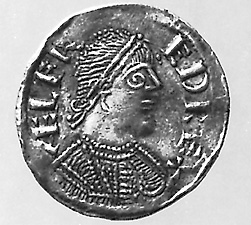Alfred the Great (849-899) was king of the West Saxons in southwestern England. He saved his kingdom, Wessex, from the Danish Vikings and laid the basis for the unification of England under the West Saxon monarchy. He also led a revival of learning and literature. He was such an outstanding leader in war and peace that he is the only English king known as “the Great.”

Alfred was born in Wantage, now in Oxfordshire, England. He was the youngest son of King Ethelwulf of Wessex. According to the Welsh writer Asser, who wrote a biography of Alfred shortly after his death, Alfred was always eager to learn. Asser says that Alfred’s mother offered a book of Anglo-Saxon poems as a prize to the first of her sons who could read it. Alfred won. As a boy, Alfred twice went to Rome, where the pope acknowledged the status of the royal house of Wessex. The journeys also showed Alfred the contrast between England and the more advanced parts of Europe.
Alfred became king in 871 at the death of his brother Ethelred. The West Saxons had been at war with the Danes for many years. After several losing battles, Alfred made peace with the invaders. But the Danes renewed their attacks and defeated Alfred at the Battle of Chippenham in 877. Alfred then defeated the Danes at the Battle of Edington in 878. The Danish leader, Guthrum, agreed to be baptized a Christian. He also agreed to stay north and east of the River Thames, in an area called the Danelaw. However, the Danes broke the peace, and Alfred renewed the war. He won London in 886. All the English people not subject to the Danes recognized Alfred as their ruler and paid him homage. The old, independent Anglo-Saxon kingdoms began to merge under the rule of Wessex.
Alfred built forts and boroughs (fortified towns) at strategic points. He stationed his fleet along the coast as protection against further invasions. He also issued a code of laws to restore peaceful government.
Before Alfred, education had declined in England because the Danes had looted monasteries and churches, the centers of learning. Alfred revived learning by bringing teachers and writers from Wales and continental Europe. He encouraged the translation of famous Christian books from Latin into Old English. Under his influence, the Anglo-Saxon Chronicle began to be compiled. It is now the main source for Anglo-Saxon history up to 1154.
